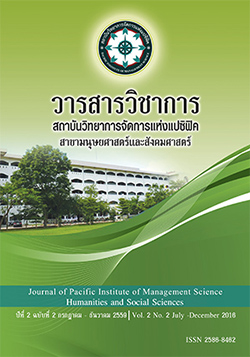Creating Online Teaching Media Using Creative Theory in Thailand 4.0
Keywords:
Online learning materials, Thailand 4.0Abstract
Teaching and learning management is an important mechanism for the development of education in Thailand. And educational management in the Thailand 4.0 is a study into the future. Focus on human production to innovate. Therefore, good teaching and learning management will need to develop teaching media. The concept of creative theory is applied in the development of teaching and learning on the Internet. It is the online learning media in the 4.0 era that develops the learners to apply knowledge to be used in innovation, tools that help teaching and learning to the learners, who are knowledgeable and knowledgeable. Knowledge is actually useful. Internet-based learning is a form where learners must conduct self-study activities. Students are free to choose content. Choose time and activities. Available on the E-Learning on the Internet is essential to designing the content of the lesson so that learners can effectively access and respond. Need to take into account Understanding of learners Interpretation and interpretation are clear. But creating tools or materials and design teaching on the Internet requires a learning theory that can help guide the creative tools of learning is accurate and useful up to the criteria set out three elements: 1) elements for the creation of teaching materials online, 2) Popular creative theories and 3) the efficiency of online teaching materials.
References
ชัยยงค์ พรหมวงศ์ .(2520).ระบบสื่อการสอน.กรุงเทพมหานคร : โรงพิมพ์จุฬาลงกรณ์ .
เนื่องวงศ์ ทวยเจริญ.(2559). ไทยแลนด์ 4.0... อะไร...อะไรก็ 4.0. วิทยากร 9 Expert Training. ภาควิชาวิศวกรรมคอมพิวเตอร์ . คณะวิศวกรรมศาสตร์ มหาวิทยาลัยธุรกิจบัณฑิตย์. http://www.9experttraining.com/articles/thailand-4.0
บุญเชิด ภิญโญอันนตพงษ์ .(2527).การทดสอบแบบอิงเกณฑ์ .กรุงเทพมหานคร : โอเดียนสโตร์ .
Amair Parssian.(2005). A hybrid instruction design model for web-based database course delivery. Inderscience Enterprises Ltd.
Driscoll, M.P.(2000).Psychology of Learning for instruction.Needham Heights,Ma;Allyn & Bacon.
Jonassen,D.H., Peck, K.L., & Wilson, B.G. (1999).Learning with technology:A Constructivist Perspective. Upper Saddle River,NJ:Merrill Prentice Hall.
Kirshner,P.A.(2001).Using integrated electronic environments for collaborative teaching/learning. Research Dialogue in learinig and instruction,2(1).
Konyangi,M.(2003).Putting courses online:Theory and practice. Retrieved January 4, 2004 from http:/ www.ils.unc.edu/disted/cmi/final2.html.
Toor, zaba Khalil.(2005).Hybrid Model for e-learning at Virtual University of Pakistan.The Electronic Journal of e-learning Volume 3 .
Willis,J.(1995).A Recursive,reflective instructional design model base on constructivist interpretivist theory.Educational Technology,Nov.-Dec, pp. 5 - 23.
Yarusso, L.(1992).Constructivism vs Objectivism. Performance and Instruction Journal, April, pp.7-9.
Downloads
Published
Issue
Section
License
บทความที่ได้รับการตีพิมพ์เป็นลิขสิทธิ์ของ สถาบันวิทยาการจัดการแห่งแปซิฟิค
ข้อความที่ปรากฏในบทความแต่ละเรื่องในวารสารวิชาการเล่มนี้เป็นความคิดเห็นส่วนตัวของผู้เขียนแต่ละท่านไม่เกี่ยวข้องกับสถาบันวิทยาการจัดการแห่งแปซิฟิค และคณาจารย์ท่านอื่นๆในสถาบันฯ แต่อย่างใด ความรับผิดชอบองค์ประกอบทั้งหมดของบทความแต่ละเรื่องเป็นของผู้เขียนแต่ละท่าน หากมีความผิดพลาดใดๆ ผู้เขียนแต่ละท่านจะรับผิดชอบบทความของตนเองแต่ผู้เดียว







